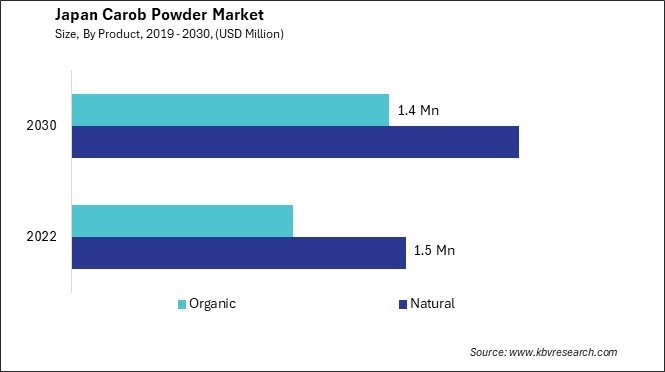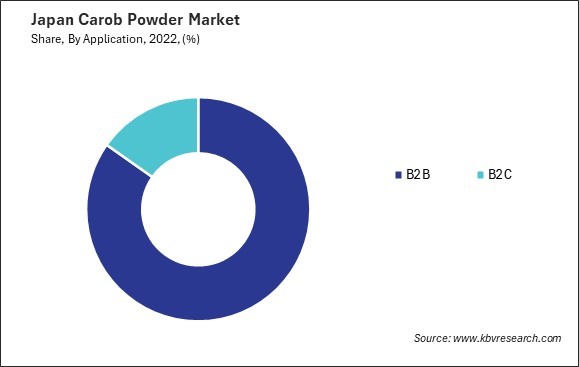Int'l : +1(646) 832-2886 | query@kbvresearch.com
Int'l : +1(646) 832-2886 | query@kbvresearch.com
Published Date : 15-May-2024 |
Pages: 51 |
Formats: PDF |
The Japan Carob Powder Market size is expected to reach $3.4 Million by 2030, rising at a market growth of 4.2% CAGR during the forecast period. In the year 2022, the market attained a volume of 207.2 Tonnes, experiencing a growth of 4.2% (2019-2022).
The carob powder market in Japan has been witnessing steady growth in recent years, driven by the increasing consumer awareness of its health benefits and versatile applications in various culinary delights. One of the key factors contributing to the growth of the carob powder market in Japan is the rising demand for natural and plant-based ingredients. Japanese consumers are becoming more mindful of their dietary choices, and carob powder aligns well with the trend toward cleaner, plant-based eating.

Japanese chefs and home cooks alike have embraced this ingredient for its ability to enhance the taste and texture of a wide range of dishes. From desserts like chocolate-flavored wagashi to savory sauces and marinades, carob powder has become a versatile ingredient in Japanese kitchens. The industry has also witnessed a surge in the availability of carob-based products in Japan. Local food manufacturers and international brands have introduced an array of carob-infused products, such as carob-flavored snacks, beverages, and confectioneries, to cater to the evolving preferences of Japanese consumers.
The COVID-19 pandemic has had both positive and negative impacts on the carob powder market in Japan. On the positive side, the heightened focus on health and wellness during the pandemic has accelerated the demand for natural and nutritious food ingredients, including carob powder. However, the pandemic has also posed challenges to the industry. Disruptions in the supply chain, logistical issues, and fluctuations in raw material prices have affected the production and distribution of carob powder in Japan. The food industry faced disruptions in sourcing and manufacturing, leading to temporary shortages of certain products.
In addition to its use in the food industry, carob powder has gained traction in the Japanese beauty and wellness sector. The powder is increasingly incorporated into skincare and cosmetic products due to its antioxidant and skin-nourishing qualities. Japanese consumers are drawn to carob-based beauty products' natural and sustainable aspects, contributing to their growing presence in the beauty and personal care industry.
According to the International Trade Administration, in 2019, Japan's cosmetics and personal care products industry reached a substantial industry size of approximately USD 35 billion. Notably, skincare products held a significant share, comprising 53% of the overall Japanese cosmetics industry. This trend expanded the carob powder market, reflecting a growing emphasis on holistic beauty and wellness in Japan's cosmetics industry.
Japan's food and beverage industry has witnessed a notable expansion, with particular emphasis on incorporating carob powder into various products. One of the key drivers behind the growth of the carob powder market in Japan is the increasing consumer awareness of the nutritional advantages of this ingredient. Japanese consumers are increasingly seeking healthier alternatives in their diet, and carob powder aligns with this trend as it is naturally low in fat, rich in fiber, and contains no caffeine.
Japanese food processors recognize carob powder's value as a versatile ingredient that aligns with the country's growing demand for healthier and more diverse food options. In response to changing consumer habits, manufacturers in Japan are incorporating carob powder into a wide range of processed foods. Its natural sweetness and nutty flavor profile make it an ideal ingredient for enhancing various products' taste and nutritional profile.
According to the U.S. Department of Agriculture, in 2020, Japan's food processing industry successfully produced food and beverage products amounting to $218.3 billion. The pandemic further contributed to the decade-long upward trend in food consumption, which has jumped from $5.56 billion in 2010 to $6.57 billion in 2020. Among these trends, carob powder is one noteworthy element gaining traction in the Japanese industry. As Japan's food processing industry continues to evolve, the incorporation of innovative and health-focused products like carob powder reflects the adaptability of the food processing sector to meet changing consumer needs.
Moreover, the Japanese food and beverage industry has embraced carob powder as an ingredient that complements traditional flavors. Its slightly sweet and nutty taste has found its way into various culinary applications, ranging from confectionery and baked goods to beverages. Hence, the burgeoning popularity of carob powder in Japan's food and beverage industry reflects a growing consumer preference for healthier options, with manufacturers recognizing its versatility and nutritional benefits.
Japan is experiencing a notable surge in the adoption of healthy food alternatives, with a particular focus on the carob powder market. As the nation places an increasing emphasis on health and wellness, consumers are turning to plant-based and nutrient-rich options, propelling carob powder into the spotlight as a sought-after ingredient. As Japanese consumers explore ways to enhance their traditional dishes with healthier alternatives, carob powder emerges as an appealing option.
One of the driving forces behind this trend is the rising awareness of the health benefits associated with carob powder. Rich in fiber and antioxidants and free from caffeine, carob powder offers a unique nutritional profile that resonates with health-conscious Japanese consumers. Its natural sweetness without added sugars also makes it an attractive option for those looking to reduce their sugar intake while still satisfying their sweet cravings in Japan.
Retailers and manufacturers are responding to the demand by incorporating carob powder into various food products, ranging from snacks to beverages, to meet the evolving preferences of health-conscious Japanese consumers. Carob powder is recognized for its potential digestive health benefits, such as aiding digestion and soothing stomach discomfort. As digestive health gains prominence in wellness discussions, Japanese consumers are drawn to products that offer functional benefits, contributing to the increased demand for carob powder. Thus, Japan's growing emphasis on health and wellness has led to a surge in the adoption of carob powder, driven by its unique nutritional profile and potential digestive health benefits.

The carob powder market in Japan is experiencing a notable surge in popularity as consumers increasingly adopt healthier and more diverse dietary choices. Several companies in Japan have recognized and capitalized on this growing trend, contributing to the country's carob powder market expansion. One prominent player in the Japanese carob powder market is NihonCarob Co., Ltd. This company specializes in producing high-quality carob powder, focusing on meeting Japanese consumers' unique taste preferences. NihonCarob emphasizes the natural sweetness and mild flavor of its carob products, catering to the discerning palate of Japanese consumers who appreciate subtlety and balance in their food.
Another key contributor to the Japanese carob powder market is Shizen Shokuhin K.K. This company is known for its commitment to natural and organic ingredients, aligning with the preferences of health-conscious Japanese consumers. It produces a range of carob products, including powder and snacks, positioning itself as a reliable choice for those seeking clean-label and minimally processed alternatives.
GenkiEats Co., Ltd. is a notable player focusing on carob's health and wellness aspects. The company produces carob powder enriched with additional nutrients, appealing to Japanese consumers who prioritize functional foods. GenkiEats' innovative approach aligns with the broader trend in Japan towards incorporating health benefits into everyday food choices.
Local players, such as Nihon Tezukuri Foods, have also entered the Japanese carob powder market, offering a range of artisanal carob products—the brand sources carob pods locally, supporting Japanese farmers and promoting sustainability. The company's emphasis on traditional craftsmanship and locally inspired flavors resonates with consumers seeking unique and culturally rooted food experiences. As consumer awareness of the benefits of carob increases, these companies are likely to play a pivotal role in shaping the future of the carob powder market in Japan.
By Product
By Application